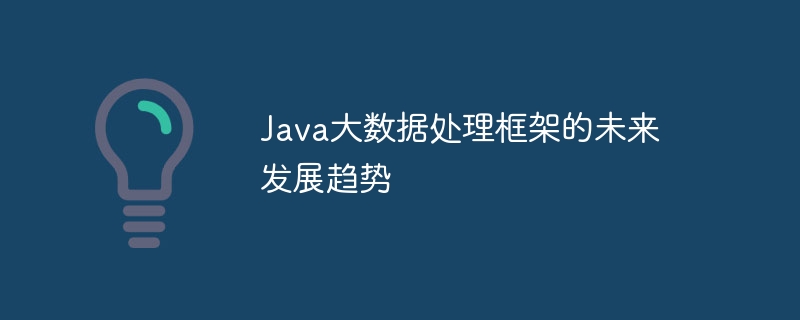Home >Java >javaTutorial >The future development trend of Java big data processing framework
The future development trend of Java big data processing framework
- WBOYWBOYWBOYWBOYWBOYWBOYWBOYWBOYWBOYWBOYWBOYWBOYWBOriginal
- 2024-04-21 11:15:01626browse
The future development trend of Java big data processing framework: Unified data platform: integrates various data sources and provides a unified data access and processing entrance. Real-time data processing: Provides a low-latency, high-throughput stream processing engine to meet real-time analysis and decision support needs. Machine learning and artificial intelligence: Integrate machine learning algorithms and artificial intelligence models to extract insights from data, predict trends, and automate tasks. Cloud-native support: Seamless integration into cloud platforms, providing elasticity, scalability and cost-effectiveness.

The future development trend of Java big data processing framework
With the continuous growth and application of big data, the demand for processing and analyzing big data is also Increasing. As a popular programming language, Java also plays an important role in the field of big data processing.
Unified Data Platform
In the future, the Java big data processing framework will develop towards a unified data platform. This kind of platform will integrate various data sources, including relational databases, non-relational databases, streaming data and file systems, and provide data engineers with a unified data access and processing entrance.
Real-time data processing
With the rise of the Internet of Things and streaming data technology, real-time data processing is becoming more and more important. The Java big data processing framework will address this need by providing a low-latency, high-throughput stream processing engine. These engines will be able to process ever-changing volumes of data and provide real-time analysis and decision support.
Machine learning and artificial intelligence
Machine learning and artificial intelligence are increasingly used in data processing. The Java big data processing framework will integrate machine learning algorithms and artificial intelligence models to enable data engineers to extract insights from data, predict future trends and automate tasks.
Cloud native support
Cloud computing has become the main platform for data processing in many enterprises. The Java big data processing framework will address this trend by providing cloud-native support. These frameworks will be seamlessly integrated into cloud platforms, providing elasticity, scalability and cost-effectiveness.
Practical case
Use Apache Storm to build a real-time data processing pipeline:
public class WordCountTopology {
public static void main(String[] args) throws Exception {
InputStream inputStream = WordCountTopology.class.getClassLoader().getResourceAsStream("spout.properties");
JSONDecoder decoder = new JSONDecoder(new FieldValueDecoder(), new FieldValueDecoder(), new FieldValueDecoder());
Spout spout = new FileSpout(inputStream, decoder);
StormTopology topology = TopologyBuilder.createTopology()
.setSpout("spout", spout)
.setBolt("split", new SplitSentenceBolt(), 8)
.setBolt("count", new WordCountBolt(), 12)
.build();
StormSubmitter.submitTopology("word-count", null, topology);
}
}This case shows how to use Apache Storm to build a real-time data processing pipeline that can process text words in the file and count the number of occurrences of each word.
The above is the detailed content of The future development trend of Java big data processing framework. For more information, please follow other related articles on the PHP Chinese website!

